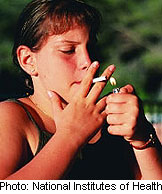- 7 Best Breads for Maintaining Stable Blood Sugar
- Gelatin vs. Collagen: Which is Best for Skin, Nails, and Joints?
- The Long-Term Effects of Daily Turmeric Supplements on Liver Health
- Could Your Grocery Store Meat Be Causing Recurring UTIs?
- Are You Making This Expensive Thermostat Error This Winter?
- Recognizing the Signs of Hypothyroidism
- 10 Strategies to Overcome Insomnia
- Could Artificial Sweeteners Be Aging the Brain Faster?
- Techniques for Soothing Your Nervous System
- Does the Water in Your House Smell Funny? Here’s Why
Menthol Cigarette Use Rising Among Young Smokers


FRIDAY, Sept. 6A growing number of young adults in the United States are smoking menthol cigarettes, a large new study finds.
Public-health efforts to curb smoking are being hindered by the marketing of mentholated cigarette brands to children as young as 12, according to the researchers, who said kids often mistakenly believe mentholated cigarettes are safer to smoke because they are easier to inhale, particularly for beginners.
“Simply stated, menthol sweetens the poison, making it easier to smoke,” said lead researcher Gary Giovino, chairman of the department of community health and health behaviors of the University at Buffalo, in a school news release. “Our findings indicate that youth are heavy consumers of mentholated cigarettes, and that overall menthol cigarette smoking has either remained constant or increased in all three age groups we studied, while non-menthol smoking has decreased.”
Using information compiled on 390,000 people aged 12 and up who participated in national surveys on drug use and health, the researchers estimated menthol and non-menthol cigarette use from 2004 to 2010.
The study found that among 84,000 smokers, menthol cigarette use was most common among young people from 12 to 17 years old, at nearly 57 percent. Of smokers 18 to 25 years old, 45 percent smoked mentholated cigarettes. Meanwhile, 30.5 percent to 33 percent of smokers older than 25 also smoked menthol cigarettes.
The study, published online Aug. 30 in the journal Tobacco Control, also showed that menthol cigarette use was associated with being female and of nonwhite race or ethnicity.
“Our findings support that the presence of menthol cigarettes in the marketplace has slowed progress in reducing smoking prevalence in the U.S.,” study co-author Andrea Villanti, associate director for regulatory science and policy at the Schroeder Institute for Tobacco Research and Policy Studies, said in the news release. “This is of great concern given the tremendous health effects of smoking cigarettes.”
Although the percentage of teens that smoked non-menthol cigarettes decreased from 2004 to 2010, rates of menthol smoking stayed the same. Among all young adults, rates of menthol smoking increased as non-menthol cigarette smoking declined. Over the course of the study, Camel menthol and Marlboro menthol use increased among teens and young adults who smoked, particularly among whites, the researchers found.
“When I was growing up, one of my older friends said he didn’t think that menthol cigarette smoking was that dangerous because he was told that they were good for you if you got a cold,” Giovino recalled. “It turns out that Kool was advertising that way for a long time but was stopped from doing so by the Federal Trade Commission around 1955. This ‘urban legend’ has persisted.”
The U.S. Food and Drug Administration is considering restricting or placing a ban on the sale and marketing of menthol cigarettes, according to the release.
“The study results should inform the FDA regarding the potential public-health impact of a menthol ban,” Giovino said. “This research provides an important view of the trends and patterns of menthol use in the nation as a whole. The FDA will consider these findings and findings from multiple other studies as it goes forward.”
More information
The American Cancer Society provides more information on menthol cigarettes.
Source: HealthDay
Copyright © 2026 HealthDay. All rights reserved.










